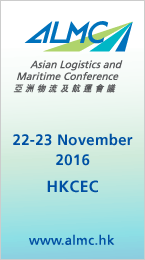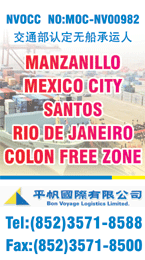|
|
|
|
2M takes advantage of Hanjin's exit by adding Far East-USWC capacity
MEDITERRANEAN Shipping Company (MSC) and Maersk Line that make up the 2M alliance are continuing to add capacity to the Far East - US west coast trade lane to fill the gap left by Hanjin Shipping's departure.
The partners will operate the first three sailings of their 'TP-1/Maple' service with vessels ranging in size from 7,800 to 9,400 TEU, reported Alphaliner.
Two of the sailings are one-way trips only, as the 9,400-TEU ships will join the US west coast to Mediterranean route after completing their transpacific eastbound voyages.
Originally, it was announced that the service would also call at Prince Rupert, but all sailings advertised so far have excluded the Canadian port and will only call at Los Angeles and Long Beach.

|
|
Hapag-Lloyd orders 5,750 reefers for South America-Europe trade
GERMANY's top carrier Hapag-Lloyd has ordered 5,750 refrigerated containers, including 5,000 FEU and 750 TEU to enable perishables to be transported for longer periods.
The new refrigerated containers are scheduled for delivery starting from October and will be gradually integrated into the existing container fleet, reported Hellenic Shipping News.
The new order coincides with the delivery of five new 10,500-TEU vessels, which the carrier ordered last April from a South Korean shipyard. The newbuildings can accommodate 2,100 reefers each and will be deployed incrementally on the trade between South America and Europe later this year.
"With the newly ordered reefers, we will be able to continue offering state-of-the-art equipment to our customers while at the same time optimising the efficiency of our container fleet," said chief operating officer Anthony Firmin.
"In this way, we are especially optimally equipped for the South America traffic, which is important in the reefer business."

|
|
Busan container volumes increase 5.5pc to 1.69 million TEU in July
THE Port of Busan's container volumes increased 5.5 per cent year on year to 1.69 million TEU in July, said the Busan Port Authority (BPA).
It has been four months since the cargo volume at Busan Port made an increase, when February throughput went up 1.8 per cent, noted St Petersburg's PortNews.
The intervening cargo decrease was January, down 1.6 per cent, March fell 2.9 per cent, April was off 5.2 per cent and, May was down one per cent, which was repeated in June.
Import and export containers were up 9.2 per cent to 832,000 TEU. Transshipments also increased 2.1 per cent to 865,000 TEU.
But total July cargo volume slipped 0.5 to 11.3 million tonnes year on year with imports and exports rising 1.3 per cent to 5.55 million tonnes.

|
|
Hanjin must discharge stranded cargo to survive: bankruptcy court
FURTHER delays in unloading stranded ships scattered throughout the world will make it impossible to revive Hanjin Shipping from bankruptcy, said the South Korean court handling the case.
Hanjin needs to quickly end the supply chain disruptions and the longer it takes to return the chartered ships means more claims and debt will pile up, a court spokesman said.
The board of Korean Air Lines, the largest shareholder of the shipping line, will meet Wednesday night in Seoul to accelerate KRW60 billion (US$54 million) of funding to the company, reports Bloomberg.
Shares of Hanjin Shipping tumbled to a record low Wednesday amid fading chances of survival and after Yonhap News Agency, citing the court, reported a rehabilitation plan was "realistically impossible."
The judge met with representatives of Korea Development Bank, the Ministry of Oceans and Fisheries, the nation's Port Authority and also those of the company.
Hanjin also slipped to 10th place in global rankings of container carriers from No 7, according Alphaliner. It is expected to experience a further drop in days to come.

|
|
China capital outflow unrelenting, 24th month, August worst since January
THE departure of China's capital is unrelenting, with Chinese banks' foreign-exchange data showing 24 straight months of outflows, according to Goldman Sachs.
Standard Chartered said that when changes in foreign-exchange reserves are netted off against trade and investment flows, August was the worst month since January, says the Wall Street Journal.
China's outflows this year are more than US$400 billion, which is reflected both in a $190 billion decline in the country's foreign-exchange reserves and a weaker yuan, down about three per cent this year against the dollar.

|
|
Shipping industry braces for more challenges ahead following Hanjin collapse
EXPERTS expect the fallout from the collapse of Hanjin Shipping is far from over, already having delayed shipments to retailers and leaving shippers and handlers uncertain of payment.
"It's not over," executive director of the port of Long Beach, Jon Slangerup, told a supply chain Conference at the University of Southern California last week. "I think there will be continual consolidation and strengthening of the entire ocean liner business."
To survive the slump in container shipping, major carriers have been forced to merge or build alliances with rivals. This year alone China Shipping Group Co and China Ocean Shipping Co are in the midst of a complex merger.
Hanjin's bankruptcy was a just a very public signal of a deepening cargo crisis, say experts and industry analysts. Shipping companies are anticipated to lose US$5 billion this year, reported Long Beach Press Telegram.
Operators of major ports also can expect a sea change, too, experts say.
"With the consolidation of industry, the ports haven't made any money," said director of financial research at Drewry Maritime Research, Rahul Kapoor, "and there will be increasing pressure on terminals."
If the current crisis results in fewer lines, the business rivalry could intensify among ports.
"They don't know who is going to be the winner," said Pacific Merchant Shipping Association vice president Michelle Grubbs.
"The industry is going through a major restructuring in order to become profitable," she said.
Given that terminal operators are often affiliated with shipping lines - or have a direct interest - the mergers could benefit one port over another.
But not everyone is worried. Regardless of the names on the ships, they will keep coming in, said port of Los Angeles executive director Gene Seroka. And so will the cargo and the revenue they bring. "You are still going to have the same amount of cargo coming through and if we are doing our jobs, we will grow," Mr Seroka said.

|
|
FESCO pre-tax profit off 32.2pc to US$47 million as sales fall 31pc
RUSSIAN shipping giant FESCO's operating profit (EBITDA) fell from January to July by 32.2 per cent year on year to US$47 million, drawn on revenues of $303.8 million, down 31 per cent.
In the seven-month period, bunker sales plunged almost five times to 65,500 tons including 7,100 tons of bunker sold in July.
The company's revenue excluding the bunkering division dropped by 18.3 per cent to $300.3 million, reported St Petersburg PortNews.
In intermodal freight, volume went up 21 per cent from June to July to 15,700 TEU, but fell 14.4 per cent to 84,500 TEU in the first seven months year on year.
In sea container movement, June to July volumes increased 4.9 per cent, but in the first seven months throughput was down 21.9 per cent year on year to 149,800 TEU.
Similarly, domestic container movement was up 25.5 per cent June to July, but down 6.1 per cent in the first seven months year on year to 30,800 TEU.
FESCO is privately owned transportation and logistics company with operations in ports, rail, integrated logistics and shipping.
"Diversified but integrated asset portfolio enables FESCO to provide door-to-door logistics solutions and control almost all steps of the intermodal transportation value chain," said a company statement.
Most FESCO operations are in the Russian Far East. FESCO is one of the leaders of container transportation through the Russian Far East via international sea container lines to/from Asian countries, domestic sea container lines and by rail.
In 2015, total container throughput at the Commercial Port of Vladivostok amounted to 345,000 TEU.
FESCO has a fleet of 19 vessels, mostly deployed through own sea service lines, and four icebreakers leased under long-term contracts.
In addition, the Group has a 50 per cent interest in JSC Russkaya Troyka and a 24.1 per cent interest in PJSC TransContainer.

|
|
DHL Express spends US$11 million to double capacity at Auckland
GLOBAL express services provider DHL Express has opened its expanded Auckland Gateway at the airport "following significant growth in international trade".
As the company's major international hub in New Zealand, the expansion follows double digit volume and shipment growth, said DHL.
The new NZ$15.3 million (US$11.1 million) facility is part of the company's global investments to bolster network connectivity and employs 130 people, creating 20 new jobs.
The new Auckland Gateway facility measures 5,000 square metres and doubles processing capacity, providing a network to more than 220 countries and territories globally.This allows Kiwi importers and exporters to trade in the global marketplace more efficiently than ever before.
"International trade via imports and exports is now 60 per cent of New Zealand's overall economic activity and is growing," said DHL Express Asia Pacific CEO Ken Lee.
Said DHL Express country manager Mark Foy: "A key driver for this expanded Gateway has been the growth in New Zealand SMEs shipping products internationally via DHL Express."

|
|
APL expands transatlantic service network with new Atlantic Gulf Express
APL is to commence a new a direct transatlantic service from October 2, to link the key markets of North Europe, US South Atlantic and Gulf of Mexico. The carrier brands the service as the Atlantic Gulf Express (AGX).
The AGX service will call at the ports of Le Havre, Antwerp, Rotterdam, Bremerhaven, Charleston, Savannah, Miami, Veracruz, Altamira, Houston and New Orleans, a company statement said.
"It promises industry-leading transit time between Europe and major US South Atlantic ports, and fast connections between the US South Atlantic, US Gulf and Mexico markets that serve the needs of the customers," said transatlantic trade manager Eric Eng.

|
|
Total Lubmarine launches new oil good for all bunkers and eco-rules
FRENCH lubricant supplier Total Lubmarine has launched Talusia Optima, a new cylinder lube oil compatible with high sulphur heavy fuel oils and ultra-low sulphur distillate fuels.
"Today is the culmination of years of work in the lab and tests at sea and Talusia Optima is now available," said Total Lubmarine technical director Jean-Philippe Roman at the recent SMM trade fair in Hamburg.
"It will make life on-board easier for ships' crews and greatly minimise the risks encountered during fuel changeovers," he said.
"The new lube is a breakthrough development that will simplify the management of vessels trading globally in and out of Emission Control Areas, and offers the potential to significantly reduce lube consumption and help extend engine life," said the Total Lubmarine statement.
Talusia Optima is suitable for use with fuels ranging in sulphur content of between 0 and 3.5 per cent," it said.
Talusia Optima has received a no objection letter from major OEM Winterthur Gas & Diesel (WinGD) for the use of the product across its two-stroke engine ranges.
Tests in sea trials have shown that its resistance to adhesive wear is better than that of conventional BN 100 cylinder lube oils, and piston coating wear rate is improved by 30 per cent.
"Indeed, the final inspection on-board one mega boxship that had used Talusia Optima for 4,300 hours while deployed on Asia-Europe liner routes, found that its engine had perfect piston and liner cleanliness," Mr Roman said.
Said Total Lubmarine marketing manager Serge Dal Farra: "We knew demand for a single oil solution was strong. No ship operator or engineer wants added complexity and we have brought a lube that is compatible with all fuel types to meet a pressing need for a simple solution.
"Our research and technical teams have created a product that counters and actively anticipates the current and future complexity of shipping operations," he said.

|
|
USCG's approval of Optimarin ballast water treatment 'coming soon'
OPTIMARIN, based in Norway, says its environmentally-friendly UV-based ballast water treatment (BWT) system will soon gain US Coast Guard approval, after it satisfied the USCG's stringent testing criteria for fresh, brackish and marine water.
DNV GL has now submitted all final documentation on Optimarin's behalf, with full approval expected in the fourth quarter. This development coincides with the ratification of the International Maritime Organisation's Ballast Water Management (BWM) Convention.
"This has been Optimarin's best year in business," said CEO Tore Andersen in a company statement. "On the back of our success with USCG testing we've seen orders steadily build, with contracts signed for over 100 of our Optimarin Ballast Systems (OBS) so far."
Mr Andersenb said USCG standards are more stringent than those of IMO and all vessels discharging ballast water in the US waters will be forced to fit systems that comply with their more demanding standard.
The company has currently received orders for 500 of the systems, which utilise a combination of filtration and powerful 35kW UV lamps to treat ballast water without the need for chemicals. Of these units 280 have been installed worldwide, with close to 100 retrofits, fitted in tandem with global engineering partners Goltens and Zeppelin.
As well as satisfying all IMO and USCG requirements, the OBS is certified by a range of classification organisations, including DNV GL, Lloyd's, Bureau Veritas, MLIT Japan, and American Bureau of Shipping.

|
|
New 'Globalia' forwarder network accepts only top flight operators
THE Conqueror Freight Network has set up the 'Globalia Logistics Network", which will be open exclusively to "first class" freight forwarders in each air and seaport location.
Applicants for Globalia will undergo a rigorous selection process including external auditing. The one in 10 applicants accepted will enjoy six months' membership for free, reports London's Air Cargo News.
Globalia founder Antonio Torres explained the importance of networks for independent forwarders: "With the multinationals taking more and more of their business daily, independent forwarders find themselves in a cooperate or die situation which rogue network operators are exploiting.
"In the last decade, the majority of the emerging networks have only been interested in one thing; collecting a membership fee. None offer the rigorous selection process we do, none offer the financial security we do and none offer the daily support and amount of quality complimentary marketing tools we do.
"Some might say that what we are launching is not new, and they would be right. We are offering the same opportunities as Conqueror but for a new group of first class companies, allowing them to work with the same calibre of agents as themselves worldwide."

|
|
FedEx quarterly profit up 3.2pc to US$715 million as revenue rises 16.3pc
US EXPRESS giant FedEx's quarterly net profit increased 3.2 per cent year on year to US$715 million, drawn on revenues of $14.7 billion, which increased 16.3 per cent, the company's earnings report revealed.
Earlier this week, FedEx announced several rate increases for 2017, which included changing the FedEx Express and FedEx Ground's US domestic dimensional weight adviser from 166 to 139.
Operating profit during the company's financial year's first quarter was up 9.5 per cent to $1.26 billion year on year, the company said.
"We expect revenue and earnings to increase driven by volume growth and improved yields at all our core companies," said company chairman, president and CEO Frederick Smith.
"The integration of TNT Express, which includes operations in more than 200 countries, is proceeding smoothly and on schedule," he said.
"More than 20 teams are working in operations and other areas to positively transform FedEx, TNT into a seamless worldwide operation," Mr Smith said.
US domestic package volume was up one per cent, due to overnight box and envelope volume growth, but with FedEx International Priority volume down one per cent.
FedEx added that operating results gains were driven by higher base rates and ongoing cost efficiencies with $22 million of expenses related to the TNT Express integration. The TNT Express segment contributed $1.80 billion in revenue.
FedEx Ground revenue was up 12 per cent at $4.29 billion, and operating profit was up 14 per cent to $610 million. Gains were made through higher prices and a 10 per cent volume increase led by e-commerce and commercial package growth.
FedEx Freight revenue was up four per cent at $1.66 billion, with operating income up two per cent at $135 million. Average daily shipments were up eight per cent offset lower fuel surcharges and shipment weight, said FedEx.
FedEx vice president Michael Glenn expects another record peak season, explaining that the rapid growth of e-commerce has driven significant shifts in demand.
Mr Glenn also reported increasing demand for Monday delivery. "The intensity for demand on Monday has accelerated in recent years, as more and more retail locations have started serving as fulfilment centres for e-commerce orders," he said.
"We expect each of the four Mondays during the upcoming peak period to be among the busiest in our company's history," said Mr Glenn.
Bigger and heavier packages were in greater demand, he said, due to e-commerce growth upping demand for delivery of "everything from large screen TVs to mattresses and trampolines".
On TNT's integration, chief financial officer Alan Graf said: "We had a seamless and very successful first day when we acquired TNT on May 25. "
Mr Graf also he saw the combination of the two businesses as transformative and expect significant synergies.
"We remain confident in our initial views of the value of this acquisition and are targeting to exit the end of the four-year integration with annual synergies of $750 million," he said.

|
|
American Airlines Cargo to promote CEIV pharma handling certification
AMERICAN Airlines Cargo has signed with the International Air Transport Association (IATA) to obtain certification for the handling of pharmaceuticals and healthcare products in a bid to promote the investments it has made over the last few years to enhance its cold-chain.
Initial stations will include the airline's home base and key hub Dallas-Fort Worth International (DFW), and Miami International, where the certification will back the MIA Airport Pharma Hub initiative, a company statement said.
The cargo carrier will also certify Philadelphia International (PHL) in support of its dedicated, 25,000 square-foot pharmaceutical and healthcare handling facility that opened in 2015.
The IATA certification, known as the Centre for Excellence and Independent Validators (CEIV), validates the capabilities associated with the proper transport of temperature-controlled pharmaceutical shipments.
In addition to the facilitation of training for warehouse handling staff on regulations and best practices, the certification includes the assessment and verification of properly-equipped facilities, processes and operational effectiveness for the correct handling of these sensitive products.
Said AA cold chain strategy manager Tom Grubb: "Our focus is on moving pharmaceuticals safely and efficiently, and being the first US carrier to promote this certification will help show our partners and customers how confident we are in our abilities."

|
|
FL Technics to supply parts to K-Mile Asia's two B737-400Fs at Bangkok
MAINTENANCE company FL Technics is to provide spare parts for two Boeing 737-400 freighters operated by Thai cargo airline, K-Mile Asia.
Under the terms of their agreement, FL Technics will provide routine and ad hoc spare parts delivery for the freighters at the carrier's hub at Suvarnabhumi International Airport (BKK) in Bangkok. The deal also includes spare parts deliveries to airports in Vietnam, Singapore and Hong Kong, reported London's Air Cargo News.
"Suvarnabhumi airport is a major aviation hub for both passenger and cargo. To ensure smooth operations from this airport, airlines need reliable partners that can provide prompt, quality support, including spare parts," said FL Technics CEO Zilvinas Lapinskas.

|
|
Increased air freight for Rockford and Rickenbacker airports
THE first ABX Air B767 freighter flight landed at Rockford Airport September 9 from Ontario and left for Charlotte, North Carolina a couple hours later.
This follows the announcement made in late August by ABX, part of the Air Transport Services Group that it is providing 20 B767 freighters to Amazon, with a daily B767 domestic cargo service to Rockford International Airport (RFD) beginning September 8, London's freightweek reported.
At the time, the airport declined to say where the aircraft would be coming from or going to, and who the customer would be "other than the pick up and delivery catchment is 90-180 minutes from the airport and the service could grow to five flights a day by the end of the year.
ABX Air 1 Amazon operates four Illinois warehouse and fulfilment facilities within that catchment area. The company also has four similar centres in North and South Carolina two hours or less by truck from Charlotte.
"This is exciting news for our region as it will create jobs and continue to put RFD on the map for our exceptional cargo operations," commented RFD executive director Mike Dunn. ABX Air will be renting a 72,000 square foot warehouse (right) for an initial one-year period.
Pinnacle Logistics will provide Terminal and ramp handling for the airline: "It is my opinion that this airport is the best prepared airport in the Midwest and in the ideal location to grow international cargo business," declared CEO Tom Wheeling.
Meanwhile 450 miles further east at Rickenbacker International Airport, 10 miles from Columbus, Morrison Express has begun using a 90,000 square foot container freight station for its new LTL truck service.
"When it comes to freight, turnaround time is everything, and both our clients and airline partners rely on seamless and expedited processes. Rickenbacker is an optimal distribution location for many global brands," said vice president and general manager of the Americas for Morrison Express, Tony Medeiros.
According to Morrison, locating at Rickenbacker enables the company to deliver freight via LTL truck to 70 per cent of the US and Canadian population within two days. Cathay Pacific, Emirates and Cargolux operate all-cargo flights into Rickenbacker several times a week.

|
|
China to become 'first trillion-dollar market' for Boeing
BOEING has projected a demand for 6,810 new airliners in China over the next 20 years, making it the first trillion dollar aviation market.
This is according to Boeing's annual China Current Market Outlook (CMO), which estimates the value of new aircraft at US$1.025 trillion.
That forecast is nearly twice the prediction made 10 years ago and shows the US-based commercial plane maker has strong confidence in the Chinese market, reports Beijing's Global Times.
The report said 75 per cent of the demand will be for single-aisle planes such as the 737 family, as low-cost carriers and full-service airlines have been adding planes and expanding new point-to-point services to meet the demand for both leisure and business travel.
As for wide-body aircraft, the fleet will triple in size, requiring 1,560 new planes such as the 787, 777 and 777X models, due to the demand from Chinese airlines that are busy exploring international routes.
"As China transitions to a more consumer-based economy, aviation will play a key role in its economic development," Boeing vice president Randy Tinseth told a press conference.
He said the company expects to see passenger traffic grow 6.4 per cent annually in China over the next 20 years.
Currently, the single-aisle fleet in China accounts for about 18 per cent of global single-aisle aircraft, but China's wide-body fleet only represents about five per cent of the global widebody segment.
The continuing expansion of China's middle class, new visa policies and a wide range of widebody planes with new technologies, capabilities and efficiencies gives Boeing confidence in the Chinese aviation market, said Mr Tinseth.
In addition, air cargo is expected to be a key driver for the growing market in China. From 2010 to 2015, the average annual growth rates for cargo were 55 per cent in volume and 39 per cent in revenue. The need could be for 180 new freighters and 410 converted freighters within the next 20 years.
According to Civil Aviation Data Analysis, carriers in the Chinese mainland introduced 38 aircraft in August this year, of which there were 14 Boeing 737-800s. Also, SF Express purchased two new 737 freighters.
Chinese airlines together comprise Boeing's largest customer, representing 25 per cent of Boeing deliveries over the past three years.

|
|











